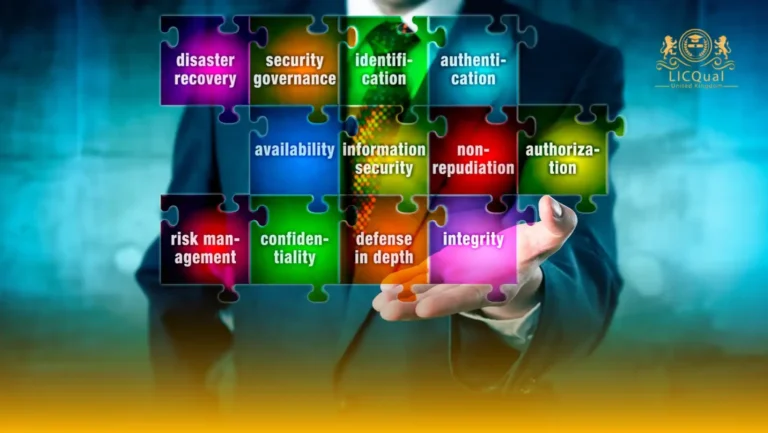The LICQual Level 3 Certificate in Healthcare Quality and Patient Safety is a professionally designed qualification aimed at individuals working within the healthcare sector who wish to strengthen their expertise in improving patient outcomes, ensuring safety standards, and driving healthcare excellence. This course is not intended for fresh candidates but for learners who already possess professional experience and are seeking to advance their knowledge, enhance their career prospects, and contribute more effectively to their organisations.
By focusing on core principles of healthcare quality management, patient safety frameworks, and risk reduction strategies, this qualification equips learners with the practical and theoretical tools required to meet the evolving demands of modern healthcare systems. It also provides an excellent pathway for Continuing Professional Development (CPD), allowing professionals to refine their skills while maintaining industry relevance.
Centres offering this qualification must ensure that delivery is supported by competent and highly qualified staff, alongside access to all essential learning resources and training materials. This ensures that every learner benefits from a high-quality learning experience, supported by expert guidance and practical insights.
Completing this certificate will enable healthcare professionals to play a pivotal role in fostering safe, reliable, and patient-centred care, while also reinforcing their own career progression within a competitive healthcare environment.
Course Overview
Qualification Title
LICQual Level 3 Certificate in Healthcare Quality and Patient Safety
Total Units
6
Total Credits
24
GLH
120
Qualification #
LICQ2200705
Qualification Specification
To enroll in theLICQual Level 3 Certificate in Healthcare Quality and Patient Safety , applicants must meet the following criteria:
|
Qualification# |
Unit Title |
Credits |
GLH |
|---|---|---|---|
|
LICQ2200705-1 |
Introduction to Healthcare Quality and Patient Safety |
4 |
20 |
|
LICQ2200705-2 |
Risk Management in Healthcare |
4 |
20 |
|
LICQ2200705-3 |
Patient-Centred Care and Communication |
4 |
20 |
|
LICQ2200705-4 |
Quality Improvement Methods in Healthcare |
4 |
20 |
|
LICQ2200705-5 |
Clinical Governance and Regulatory Compliance |
4 |
20 |
|
LICQ2200705-6 |
Incident Reporting and Learning Systems |
4 |
20 |
By the end of this course, learners will be able to:
Unit 1: Introduction to Healthcare Quality and Patient Safety
By the end of this unit, learners will be able to:
- Define key concepts of healthcare quality and patient safety.
- Explain the role of safety culture in healthcare organisations.
- Identify common challenges and barriers to achieving quality in patient care.
- Apply basic patient safety frameworks to real-world healthcare contexts.
Unit 2: Risk Management in Healthcare
By the end of this unit, learners will be able to:
- Recognise types of risks in healthcare settings.
- Apply risk assessment tools to identify potential hazards.
- Develop strategies to reduce and control risks.
- Evaluate the impact of effective risk management on patient outcomes.
Unit 3: Patient-Centred Care and Communication
By the end of this unit, learners will be able to:
- Describe the principles of patient-centred care.
- Demonstrate effective communication strategies with patients and families.
- Recognise the importance of empathy, ethics, and cultural sensitivity in care delivery.
- Apply patient engagement techniques to improve safety and trust.
Unit 4: Quality Improvement Methods in Healthcare
By the end of this unit, learners will be able to:
- Explain quality improvement tools and methodologies (e.g., PDSA cycle).
- Analyse healthcare processes to identify areas for improvement.
- Apply evidence-based approaches to enhance service delivery.
- Evaluate the effectiveness of quality improvement initiatives.
Unit 5: Clinical Governance and Regulatory Compliance
By the end of this unit, learners will be able to:
- Define the principles of clinical governance.
- Identify key regulatory and accreditation standards in healthcare.
- Explain the importance of accountability and ethical practice in patient safety.
- Apply compliance frameworks to ensure safe and effective healthcare delivery.
Unit 6: Incident Reporting and Learning Systems
By the end of this unit, learners will be able to:
- Explain the importance of incident reporting in improving patient safety.
- Demonstrate the process of root cause analysis in incident investigation.
- Develop recommendations based on lessons learned from safety incidents.
- Promote a no-blame culture that encourages transparency and learning.
The LICQual Level 3 Certificate in Healthcare Quality and Patient Safety is designed for individuals who want to develop expertise in healthcare quality improvement and patient safety. Whether you are starting your career, seeking professional development, or aiming for hospital management roles, this course provides practical skills, recognized certification, and career-ready knowledge.
Aspiring Healthcare Professionals
- Individuals starting a career in healthcare administration or hospital management
- Learners wanting to understand healthcare quality and patient safety protocols
- Those aiming to gain a recognized Level 3 patient safety diploma
- People interested in improving hospital processes and patient outcomes
- Candidates looking to develop practical skills in healthcare operations
- Individuals seeking flexible, career-focused healthcare training
Healthcare Support Staff
- Receptionists, clerical staff, and medical assistants in healthcare settings
- Employees aiming to formalize experience with professional certification
- Staff wanting to improve accuracy in patient record management
- Team members looking to enhance communication and operational skills
- Existing support staff seeking career progression in healthcare quality and safety
- Staff aiming to contribute to safer hospital environments
Nurses and Allied Health Professionals
- Nurses seeking knowledge in patient safety and quality improvement
- Allied health professionals aiming to enhance clinical operations skills
- Staff looking for structured Level 3 certification in healthcare quality
- Professionals wanting to implement patient safety measures effectively
- Employees seeking practical, real-world healthcare training
- Learners aiming to improve compliance with healthcare standards
Career Changers
- Professionals moving into healthcare administration or hospital management
- Individuals seeking structured Level 3 certification in quality and safety
- Learners aiming to understand hospital operations and risk management
- People interested in practical training for patient safety improvement
- Candidates wanting recognized qualification for new healthcare roles
- Individuals seeking career growth with minimal prior healthcare experience
Students and Recent Graduates
- Graduates looking to start a career in healthcare administration
- Students exploring healthcare quality and patient safety as a career path
- Recent graduates seeking recognized professional certification
- Learners aiming to build practical hospital management skills
- Students wanting to enhance CV and employability in healthcare
- Individuals seeking flexible online or blended learning options
Employers and Workplace Learners
- Hospitals and clinics investing in staff skill development
- Organizations seeking qualified personnel in healthcare quality and safety
- Teams aiming to improve operational efficiency and patient care
- Employers promoting professional certification for staff career growth
- Companies wanting to strengthen hospital management processes
- Staff seeking structured, practical training aligned with industry standards
Centres delivering the LICQual Level 3 Certificate in Healthcare Quality and Patient Safety must ensure that all training and assessment are conducted to the highest professional standards. To achieve this, centres are required to meet the following conditions:
- Qualified and Competent Staff: Training must be delivered and assessed by professionals with relevant qualifications, healthcare expertise, and proven experience in patient safety and quality management.
- Access to Learning Resources: Centres must provide learners with up-to-date course materials, digital learning platforms, case studies, and practical resources to support high-quality training.
- Appropriate Facilities: Training centres should have suitable classrooms, IT facilities, and access to online or blended learning systems to support effective teaching and learning.
- Robust Assessment Systems: Centres must implement fair, transparent, and reliable assessment methods that reflect international healthcare standards and support learner achievement.
- Continuous Professional Development (CPD) Support: Staff involved in training delivery should engage in ongoing CPD to maintain current knowledge of healthcare safety, governance, and quality improvement practices.
- Quality Assurance and Compliance: Centres must follow LICQual policies, maintain accurate records, and demonstrate compliance with quality assurance requirements to ensure consistency in learner outcomes.
- Learner Support Services: Centres should provide effective academic guidance, mentoring, and administrative support to help learners succeed in their qualification.
By meeting these requirements, centres will ensure that learners gain a high-quality, industry-relevant learning experience, equipping them with the essential knowledge and skills to enhance healthcare quality and patient safety.
Assessment and Verification
All units within this qualification are subject to internal assessment by the approved centre and external verification by LICQual. The qualification follows a criterion-referenced assessment approach, ensuring that learners meet all specified learning outcomes.
To achieve a ‘Pass’ in any unit, learners must provide valid, sufficient, and authentic evidence demonstrating their attainment of all learning outcomes and compliance with the prescribed assessment criteria. The Assessor is responsible for evaluating the evidence and determining whether the learner has successfully met the required standards.
Assessors must maintain a clear and comprehensive audit trail, documenting the basis for their assessment decisions to ensure transparency, consistency, and compliance with quality assurance requirements.







